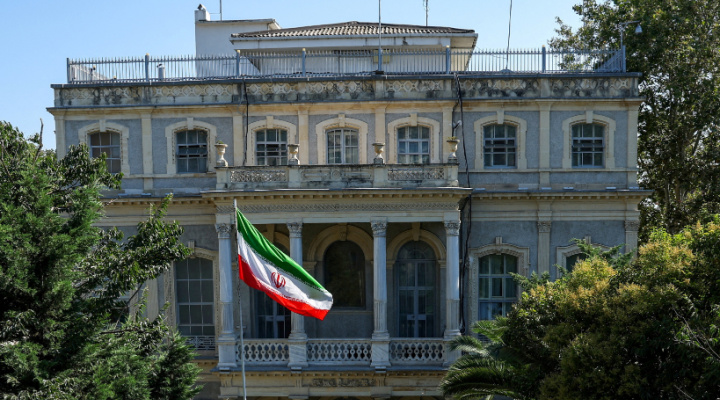General view of the Iranian Consulate where Iran holds nuclear talks with so-called E3 group of France, Britain, and Germany, in Istanbul, Turkey, July 25, 2025. Photo: REUTERS/Dilara Senkaya
Senior officials from Iran and Europe’s top three powers met in Geneva on Tuesday to discuss the Westerners’ demand that Iran revive nuclear inspections and diplomacy or face the reimposition of sanctions that were lifted under a 2015 deal.
France, Britain, and Germany, known as the E3, have long threatened to trigger the “snapback” of sanctions at the United Nations Security Council by October, when the now largely defunct nuclear deal between Tehran and major powers expires.
They have more recently said they plan to decide by the end of August unless Iran offers concessions that could convince them to hold off for a short time, often referred to as an extension. Talks are tense as Iran is furious at the bombing in June of its nuclear facilities by the US and Israel, the E3’s allies.
“We are going to see whether the Iranians are credible about an extension or whether they are messing us around. We want to see whether they have made any progress on the conditions we set to extend,” one E3 official said.
Those conditions are the resumption of UN inspections, including accounting for Iran‘s large stock of enriched uranium, and engaging in diplomacy, including with the United States. Iran has repeatedly ruled out direct talks with Washington.
Iranian Deputy Foreign Minister Kazem Gharibabadi said on Tuesday after the meeting that Tehran remained committed to diplomacy and a mutually beneficial solution.
“It is time for the E3 and the UN Security Council to make the right choice and give diplomacy the time and space it needs,” he said in a post on X.
Officials in Geneva said they did not expect public statements to be made there during the meeting. The European Union, which serves as coordinator of the 2015 deal, was also due to attend.
Israel and the United States have said they needed to strike Iran‘s uranium enrichment sites because it was making such rapid advances towards being able to produce a nuclear weapon.
Tehran denies any intention to develop atomic bombs.
ENRICHMENT DRIVE
Iran has been enriching uranium to up to 60 percent fissile purity, a short step from the roughly 90 percent of weapons-grade, and had enough material enriched to that level, if refined further, for six nuclear weapons before the strikes started on June 13.
Actually producing a weapon would take more time, however, and the International Atomic Energy Agency has said that, while it cannot guarantee Tehran’s nuclear program is entirely peaceful, it has no credible indication of a coordinated weapons project in the Islamic Republic.
While Iran‘s enrichment plants were badly damaged or destroyed in the June war, Tehran has not granted the IAEA access to them since then, arguing that it is not safe for inspectors. The status and whereabouts of Iran‘s large stockpile of enriched uranium are also unclear.
“Due to the damage to our nuclear sites, we need to agree on a new plan with the agency — and we’ve conveyed that to IAEA officials,” one Iranian official said.
Western officials have said they suspect Iran has returned to negotiating tactics aimed at buying time and dragging talks out. The E3 will seek to determine in their talks on Tuesday whether that is now the case.
Tehran has warned of a “harsh response” if sanctions are reinstated.
Click this link for the original source of this article.
Author: Reuters and Algemeiner Staff
This content is courtesy of, and owned and copyrighted by, https://www.algemeiner.com and its author. This content is made available by use of the public RSS feed offered by the host site and is used for educational purposes only. If you are the author or represent the host site and would like this content removed now and in the future, please contact USSANews.com using the email address in the Contact page found in the website menu.





